Decentralization
In my last post I mentioned that Robert Wood Johnson (son of Company founder Robert Wood Johnson the first) had an idea about how to increase the Johnson & Johnson business. And his idea was…to take an almost year-long trip around the world. It’s not as farfetched as it sounds, because that trip led to Johnson & Johnson becoming a decentralized global company.
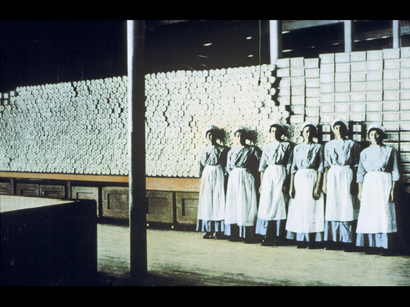
Cotton Mill Workers with Cotton Products
In the aftermath of World War I, both Johnson & Johnson and the United States were recovering from the dislocation caused by the conflict. The reaction to the casualties and devastation caused by the brutal trench warfare caused growing feelings of isolationism across the U.S. The Company’s production levels stayed high while supplies of hospital and consumer products were refilled, but it was clear that this would not last, and new opportunities for growth would quickly need to be found. Robert Wood Johnson had moved from manufacturing and was now in sales and marketing, areas in which he had a natural ability. Johnson, who was still in his 20s, had joined the Company instead of going to college. Though he had done well as general superintendent in charge of manufacturing, a position he had held starting in April of 1918, he still remained unproven to some members of management.
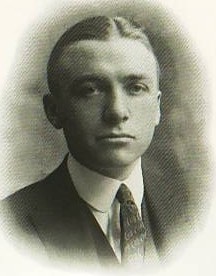
Robert Wood Johnson
Robert Wood Johnson very perceptively felt that the United States was being forced into a policy of isolation that would destroy the Company’s vigorous export business. He determined that the way to prevent that was to form international operations instead of relying on third parties to sell the products across the world…and at the time, he was virtually alone in believing that. Others, including Robert’s uncle James Wood Johnson (who was President of the Company), felt that they should concentrate instead on expanding their existing network of sales agents and distributors. The topic was debated for more than a year. In the fall of 1922, Robert and his brother Seward asked the Board of Control to approve a study to get first hand information on the practicality of opening operations around the world. The study would involve both young men traveling the world for almost a year.
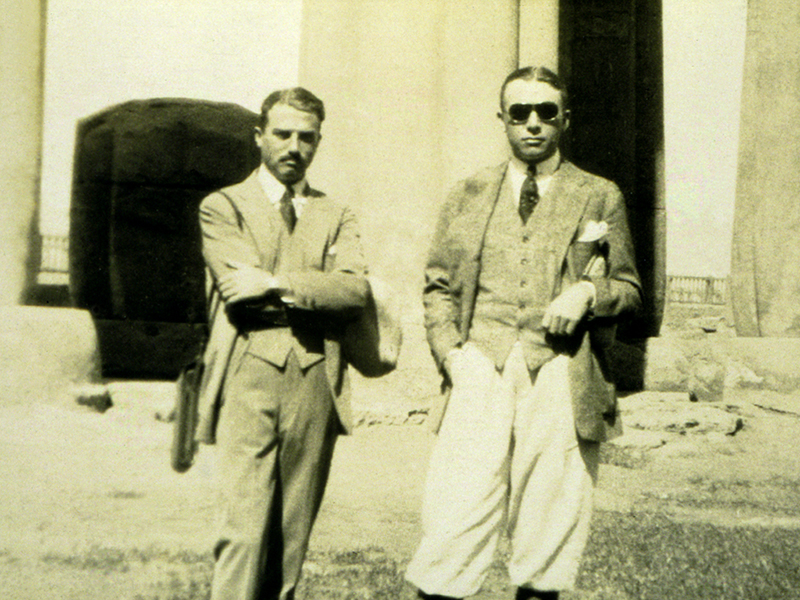
Seward Johnson (L) and Robert Wood Johnson (R) in Egypt
The Board reluctantly agreed to the trip. Robert and Seward spend a year preparing. They collected letters of introduction, and researched business conditions in parts of the then British Empire (chosen because it had a developed economy) as well as other areas of the world. Robert Wood Johnson and his brother boarded the S.S. Olympia to start their journey on October 1, 1923. Johnson’s goals for the trip were to figure out the Company’s course of action in international business, to see if it was possible to open international affiliates, and also to investigate the supply of cotton from overseas, since cotton was a key element in many of the Company’s surgical and first aid products.
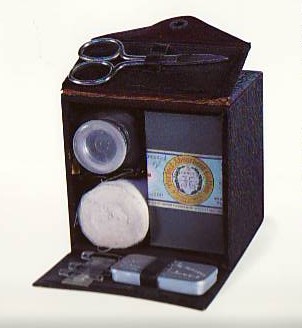
Interior of World War I-Era First Aid Kit
Robert Wood Johnson and his brother Seward visited twelve countries: England, France, Belgium, China, Japan, Australia, South Africa, India, Sri Lanka (called Ceylon in those days), Egypt, the Netherlands East Indies, and the Philippines. They spoke with officials, visited pharmacies and hospitals, learned how medical products were distributed in each country, and researched the state of health education…since educating people about health was one of the ways in which Johnson & Johnson had built its business since 1886. Johnson, ever-forward looking, wrote that he saw a market in Egypt for absorbent cotton (a process that had not yet been introduced there) and a market for medicated plasters, if the Company could launch an Arabic-language advertising campaign. (Robert Wood Johnson: The Gentleman Rebel, by Lawrence G. Foster, p. 158) Their journey, over land and by ship, took seven months, and they sent 36 reports back to New Brunswick.
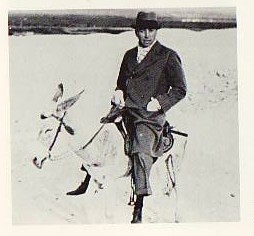
Robert Wood Johnson in Egypt
Back in New Brunswick, Robert immediately pushed to form a British affiliate company. When the board approved his plan, he went to England to look for a suitable manufacturing facility. The British sales agents from John Timson & Company, Selby and Butterfield, would join the Company and help run the new business in England. After much haggling with Mr. Selby and Mr. Butterfield over the location (neither man wanted it to be too far from where he lived), they settled on Slough in Buckinghamshire, which would inconvenience both managers equally. The Slough Observer, quoted in Robert Wood Johnson: The Gentleman Rebel, noted that the new operation was “ ‘…an all-British firm…employing only British labour.’ ” (RWJ: Gentleman Rebel, p. 161) This practice of having locally-run decentralized operating companies employing local citizens insured that the new organizations were flexible and closely tied to the needs of local consumers. It would become the main principle behind the expansion of Johnson & Johnson.
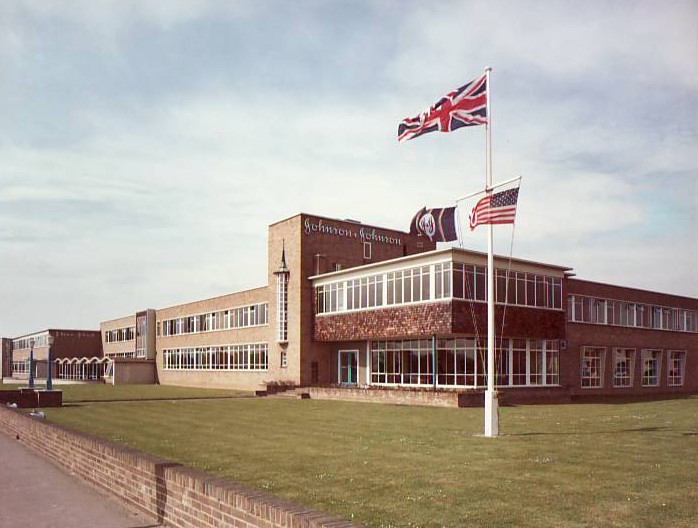
Johnson & Johnson operating company in Slough, England, 1968
The U.K. operating company opened in 1924. It was followed in 1930 by affiliates in South Africa and Mexico, Australia in 1931, Belgium and France in 1934, Ireland in 1935, Argentina and Brazil in 1937, India in 1957, and more, continuing a steady worldwide growth. Today, there are more than 250 operating companies in 57 countries.
Decentralized international expansion was one of many ideas that Robert Wood Johnson would bring to the company his father and uncles founded.

Excellent and historical information that I never knew about one of America's oldest and smartest business operations.
I wonder how "The General" would be feeling today watching Johnson & Johnson now moving to " Globalization " surely against this great mans philosophy.I would have liked to be in the boardroom watching his face when this was first muted.